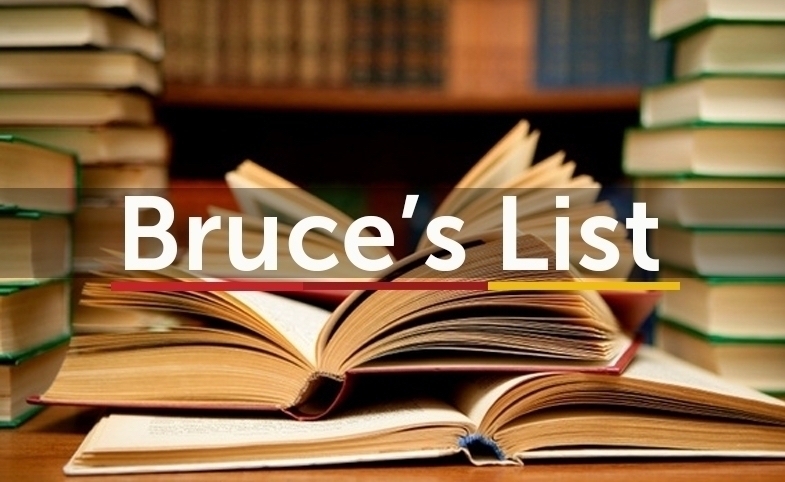
Latest Must-Reads in Public Diplomacy: August 2022
CPD Faculty Fellow Bruce Gregory has compiled a list of the latest must-reads in public diplomacy. Known affectionately at CPD as "Bruce's List," this list is a compilation of books, journal articles, papers and blog posts on a wide variety of PD topics.
Highlights from the latest list include:
Sohaela Amiri, Understanding the Dynamics between U.S. City Diplomacy and Public Diplomacy.” Journal of Public Diplomacy 2, No. 1 (July, 2022): 1-5.
Joel Day, Building a Citywide Global Engagement Plan, CPD Perspectives, USC Center on Public Diplomacy, February 2022. In this thoughtful and well-organized study, CPD Research Fellow Joel Day (UC San Diego) presents three analytical categories through which to advance knowledge about city diplomacy. First, he argues the central motivation in today’s global engagement of cities is grounded in governance choices broader than traditional drivers of cultural exchange and protocol – (1) diplomacy that advances a city’s competitiveness in the international political economy or (2) diplomacy that seeks global relationships that improve the welfare of a city’s residents. Decisions rest on establishing priorities and the possibility of doing both. Second, he provides a list of five practical steps for local leaders contemplating a decision to engage globally. A “who, what, when, where, and why” guide for planners based on specific issues in modern cities. Third, his study develops a research agenda for scholars that emphasizes the importance of building a longitudinal data set that examines the actors, actions, targets, motivations, and outcomes of city diplomacy over time. Scholars and practitioners will find Day’s study a useful addition to the literature.
Ilan Manor, Exploring the Semiotics of Public Diplomacy, CPD Perspectives, USC Center on Public Diplomacy, April 2022. CPD Research Fellow Ilan Manor (University of Oxford) looks at how diplomats use visuals on social media platforms to influence views of digital publics. His article opens with comments on how diplomats practice visual narration in online public diplomacy campaigns. Then, borrowing semiotics ideas of Roland Barthes, he investigates how diplomats use visuals “as ideological devices” to advance norms, values, and offline policy goals. Manor’s objective is to explore diplomats’ intent through interviews with practitioners associated with social media campaigns in foreign ministries in Israel, the UK, and Lithuania. The article contains a literature review and his account of how diplomats’ use of social media platforms “has advanced from reactive to proactive digitalization.” It also points to research opportunities: application of his methodology to other cases, assessment of links between online and offline outcomes in digital campaigns, and ways ministries of foreign affairs institutionalize visual narration practices. Researchers might also compare diplomacy’s use of digitalized visual narratives with earlier visual narratives used in analog technology platforms, the strengths and limitations of the Barthes semiotics ideas, and the wealth of empirical evidence generated by war in Ukraine.
Michael S. Pollard, Charles P. Ries, and Sohaela Amiri, The Foreign Service and American Public Opinion: Dynamics and Prospects, (RAND, 2022). This report by RAND researchers, with support from the Una Chapman Cox Foundation, examines American public opinion relating to diplomacy and the Foreign Service. Methods included opinion surveys and moderated on-line focus groups. The report produced evidence that Americans overall had generally favorable attitudes toward US diplomats but also a “limited understanding of what diplomats actually do, how they are selected, and how diplomacy interacts with other elements of America’s national security establishment.” Among other findings:
· Greater awareness of “helping citizens abroad” than other diplomatic functions;
· High priority given to “understanding of global affairs” and “negotiating” as important diplomatic skills;
· Low priority given to “public speaking,” “bravery,” “discipline in following instructions,” and “empathy;”
· Over 65% believe diplomacy contributes to national security;
· More than 40% think it is “better for diplomats to lead efforts abroad” (compared with 20% favoring the military and the rest no opinion);
· A preference for keeping spending on foreign affairs “about the same” with “relatively more support for cutting than adding to funding in 2020.”
The report addressed implications for creating better understanding of diplomats and diplomacy.
The full list for this edition of Bruce's List can be found here.
Visit CPD's Online Library
Explore CPD's vast online database featuring the latest books, articles, speeches and information on international organizations dedicated to public diplomacy.
Popular Blogs
-
January 29
-
January 20
-
January 28
-
February 6
-
January 8







